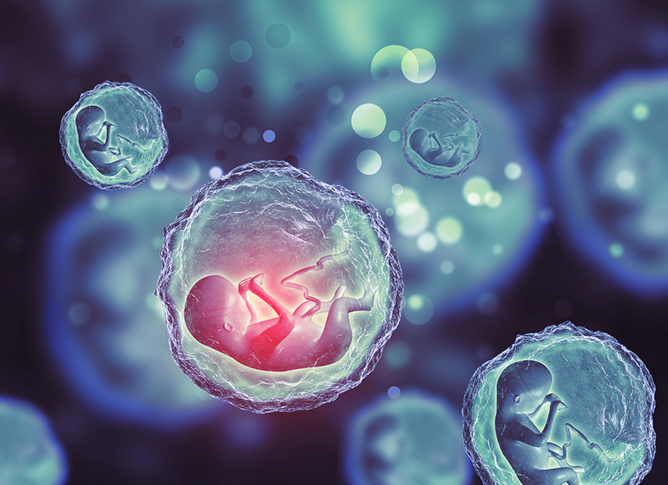Legal Treatment of Frozen Embryos Upon Dissolution. Part 6 of 6.

Which Approach is California Most Likely to Adopt?
Hecht v. Superior Court (1993) 16 Cal.App.4th 836, and In re Estate of Kievernagel (2008) 166 Cal.App.4th 1024, California cases discussed in Part 2 of 5 of this series, suggest that the pre-embryo would be treated with special respect given its potential to become human life, while still remaining “property” over which the Court has jurisdiction.
California Family Code §§ 721 & 1620 provide that spouses may create valid contracts with each other with respect to property.
Hecht and Kievernagel together, are California cases providing that gametic material, though treated with special respect given its propensity to produce human life, is property subject to disposition through a will, and property over which the court has jurisdiction.
Hecht found that the right of possession or ownership of the gametic material brought the subject material within the probate court’s jurisdiction to bequeath pursuant to the decedent’s intent. This principle can easily be transferred to Family Law. The parties’ joint right of possession and ownership of the pre-embryo bring the subject material within the family court’s jurisdiction to determine the parties’ respective property rights.
Assisted reproduction agreements are recognized in California (See California Family Code §§7606, 7960 et seq. The enforceability of said agreement regarding disposition of frozen pre-embryo between spouses has not been specifically addressed by the legislature. This will be, at some point, an issue of first impression.
We at Hartley Law, APLC Et Al, anticipate the methods from Davis v. Davis (1992) 842 S.W.2d 588, discussed in Part 5 of 6 of this series , will be adopted by the California courts. The Courts will first look to the current wishes of each of the parties. If these wishes align, that would be adopted as the order of the Court. If they do not agree, the Court will look to prior agreements between the parties, and consider said agreements valid and enforceable. If there is no agreement, the Court will then weigh the parties’ respective interests in the pre-embryo. Davis has been used for direction in both Kievernagel and Hecht, cases coming from two separate appellate districts in California.
Aside from Davis v. Davis, supra, we have identified no other case used for guidance in California. However, before ruling on a case specifically regarding the disposition of pre-embryo in a divorce, the California courts will consider the methods and rulings applied in the cases discussed throughout this series.
We at Hartley Law, APLC Et Al, having had vigorous discussion about this, have not reached a unanimous answer as to which one approach California’s courts would apply. It is likely that whichever appellate court in California is first tasked with this question, will adopt either the contractual approach or balancing approach, as each takes into account prior agreements between the parties. If there is no agreement between the parties, the Court will determine whether mutual contemporaneous consent is required, or whether it will balance the interests of the parties. I see little indication as to how the California courts would rule absent a prior agreement between the parties.
Unanswered Question: If the Objecting Party Does Not Prevail, Is He/She Deemed the Parent of the Child?
California Family Code §7613(b)* states “The donor of semen provided to a licensed physician and surgeon or to a licensed sperm bank for use in assisted reproduction of a woman other than the donor’s spouse is treated in law as if he were not the natural parent of a child thereby conceived, unless otherwise agreed to in a writing signed by the donor and the woman prior to the conception of the child.”
As yet, this statute has not been applied to the donation of sperm by a spouse to fertilize an pre-embryo which is not implanted prior to dissolution. The sperm, in each case discussed in this series, was provided to the licensed physician while the donor was still a spouse, so this is a question likely to arise even though the pre-embryo was not used by a surgeon for assisted reproduction until the donor was no longer a spouse.
Will the courts determine that the parental status of the donor is determined at the time the pre-embryo is fertilized? If so, logically, the donor would be considered the natural parent of the child, even if implanted after separation and over objection. I cannot even guess at how the courts might move on the question of legal parentage. I can see arguments for either position. The outcome of this question will be quite dependent on the facts of the individual case.
Will the courts determine that the parental status of the donor is determined at the time the pre-embryo is implanted? If so, it is possible the donor would only be considered the natural parent if there is a written agreement between the parties. Again, I can see arguments for either position. I don’t see a bright line rule developing on this anytime soon, unless the legislature gets further involved.
—–
*That portion of the statute which provides that, if implantation occurs during marriage, the child is legally the child of the parties, would likely not be applied to a child implanted post-separation of married parties. Yet, I can see an argument developing in this direction if the right facts develop.
**For information on the various approaches courts throughout the United States have developed with regard to legal treatment of frozen embryos upon divorce of the donors, please refer to Parts 3-5 of this 6-part series.</p





